Douglas Cootey's Blog, page 13
July 9, 2016
Insensitive Mental Health Advice People Give, Misquoted
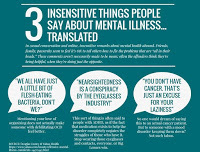
I woke up this morning to discover I had been quoted! Finally! Somebody noticed my insightful commentary on the world and felt it noteworthy to share. I could expect to see a boost in page hits, maybe some social media traction, and dare I hope, more sales of my book, “Saying ‘NO!’ to Suicide”. Then I noticed a tiny problem. As much as I appreciated the signal boost from Healthy Minds on Facebook and Twitter, I wasn’t actually quoted. In fact, I hadn’t said any of the comments attributed to me. The cited quotes were the cheeky bullet points and summaries of the article author, Sabrina Rojas Weiss. Healthy Minds was just trying to bring attention to an important issue, and should be commended for their efforts, but I want to make sure that the right people get attributed.
Just in case you missed the article when I shared it last year, here’s a link: ‘Cancer Is Just An Excuse’ – Insensitive Things People Say About Mental Illness, Translated. It’s a sarcastic take on a problem many people dealing with mental illness face regularly.
Family & friends mean well when they offer advice, but their well-meant suggestions are often hurtful simply because they don’t take a moment to truly understand the nature of the mental health problem. I’ve said this for years. You need to understand the problem so that you can offer helpful solutions. For example, I’m told regularly, “You’re so smart! You should do X job or Y job!!” They mean it as a compliment, but underlying the “compliment” is the assumption that I can simply go out and do what they believe I can do. I say, “Sure, but do you know of a place that will let me call in sick weekly because of ticking and still keep me on?” They don’t. Neither do I. But the problem is that their help ends there until they think of another job I should be trying to do instead—again without consideration of my actual limitations. They don't analyze the situation long enough. In fact, if I don’t take their advice, many of them lose faith in me. It doesn’t mean their advice wasn’t helpful. No, no! I couldn’t mean that. It just means I’m too negative, or defined by my labels, or something. I’ve never been able to make sense of it. My limitation isn’t a lack of gumption. It isn’t a lack of confidence. It isn’t laziness. It’s an actual disability.
Here’s a recent example of my disability at work: The other day I was supposed to write and write and write. I had a month’s worth of blogs to write for here and for Family Guy. Instead, I ticked and vocal ticked the day away. Some of these were paid writing assignments I desperately needed to finish and invoice, but no writing was done that day at all. While ticking, I can’t think properly. My brain is a little busy. But you know, I’m just not trying hard enough, right⸮
Sabrina’s article took different statements from me and other bloggers, then compiled them together. Her point was that you don’t tell blind people to think positively so that they can see better, so why do you tell people with, for example, depression, to just be happier? I believe willpower plays a core part in coping with mental illness. Willpower makes the difference between moving forward while coping with depression versus sitting on the couch Netflix-binging while depressed. Willpower helps me keep trying to master ADHD with coping strategies versus giving into the mental chaos. However, willpower is just one of many coping strategies we need to employ for mental health and recovery. Willpower is a tool, not a cure.
At any rate, I just wanted to correct the record, and here I am writing a blog post on the subject of bad advice and the nature of will instead. These are my verifiable statements from the article:
Quote #1: “I have been told some shocking things from people who were supposedly educated, but stigma always marred those conversations,” Douglas Cootey, who blogs about his depression and ADHD, told Yahoo Health. “I’ve been told that I wasn’t truly suicidal because I stopped myself without needing hospitalization.”
Quote #2: “The comment that took the cake was when my next-door neighbor, who was an elementary school teacher, told me that ADHD was an excuse that people used to get out of doing homework,” said Cootey, who began his blog 11 years ago in part to train himself how to respond to ignorant comments.
Quote #3: “I’ve been told that my depression is not real because I manage it without meds,” Cootey said.
I’m afraid the text quoted in that graphic was all written by Sabrina. Give her article a read. I thought she did a great job with the material. She should get all the credit.
⁂
If you want to read actual statements by me, you should read my book. It’s loaded with my words.
July 8, 2016
Suicide Prevention: The Sun Always Rises
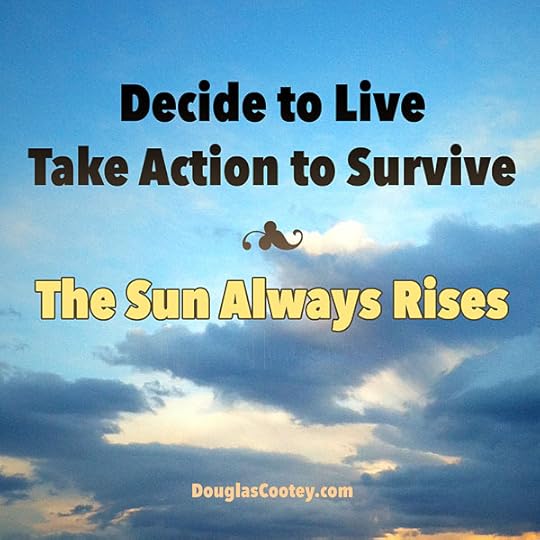
My friend, Paul Tuck, died three years ago today. I’ve been thinking about him lately. I miss his zany and quick humor. I miss his smile and his laugh. To be honest, though, I didn’t like him much when I first met him. He delighted in playing devil’s advocate on any issue that was opposite of where you stood at that moment. My first introduction to Paul was when I was giving him and my friend, Nathan, a ride from some event in Salt Lake City, and he was arguing about the superior quality of 8-bit Nintendo music over the Sega Master System or something, and I couldn’t get him home fast enough. He was a masterful troll. Over the years I learned to understand his humor, and more importantly, recognize when he was having fun with me. I, also, learned to have fun back.
I remember impressing him when I got my Amiga 2500 to run a Mac emulator through a PC emulator. It was terribly slow, and Nathan thought I was insane, but Paul appreciated the mad genius of the moment. Another time I opened a VNC tunnel from my Amiga to my OS/2 PC, and opened a VNC tunnel from my PC back to my Amiga. The screens recursively drew themselves into an infinite loop, like mirrors reflecting eternity. Paul loved geeky stuff like that.
Paul’s suicide hit me hard that summer. I had just begun writing “Saying ‘No!’ to Suicide” the month before when I got the news that he had taken his own life. Sitting in his funeral service, and watching all the grieving family members around me, suddenly gave me the approach I needed for my book. I revised my introduction that night. The rest came easily after that.
The insight I gained was to address both the suicidal loved ones, and those who remained behind. It was a painful perspective that only life can give to you. I had never before had a loved one commit suicide before, and it changed me. It was also when I settled on dawn as a theme for my book. You see, what saved me years ago, and time and again, was that I always knew the sun would rise. Whatever terrible thing I was overwhelmed with at that moment, would evaporate with the morning dew. Paul didn’t have that perspective. I didn’t even know he was struggling. I wish I could have helped him. Maybe I could have made a difference, but time only moves forward. We can’t fix the past.
If you are struggling with suicidal ideation today, I encourage you to reach out to somebody you trust. Don’t carry your burden alone. Depression deceives us, and we don’t always think clearly under its influence. I have a support network I rely on when my depression takes a dark turn for the worse. I’ve, also, found four reasons to live that help me look past the darkness: my daughters. They help me see that dawn is just breaking on the horizon when I might otherwise think I’m drowning in the night.
I’m glad that I have learned to master these dark urges. I haven’t felt suicidal in a long while, and it’s quite a relief. My daughters are relieved as well. The struggle to fight suicidal tendencies can be exhausting, but we truly can train ourselves to change how we think. I can’t help Paul, but hopefully somebody out there is reading my book or my blog and learning that we don’t have to suffer. We can choose to live.
The sun always rises.
⁂
I share more thoughts on overcoming suicide in my book. Follow the link to read Chapter One for free right in your browser.
July 6, 2016
What‽ It's Wednesday already?
I’m not sure what I was thinking last month, but I scheduled an enormous amount of appointments for this week. Independence Day was busy enough as it was, but I’m fairly certain my future self went back in time to punish myself by trapping me inside a hot car and sending me all over Salt Lake Valley. Then he hid my keys.
Future me is a real jerk.
At least important doctors appointments and therapy sessions for my kids are being met, but my work schedule has been left on the side of a hot, Utah highway somewhere. If I envision ravens circling my work schedule to feed on its disorganized corpse, that’s more creativity than I’ve been able to summon all week.
I was going to post the first chapter of my Fighting Depression book, but I reorganized the concepts from the depression blog I am basing the book on, and suddenly there are less than ten items. Eight Ways to Fight Off Depression just doesn’t have the same punch for me, so I need to rethink my approach. Hopefully, I’ll have something to share with you by the weekend.
The takeaway from this is that sometimes life pushes us around, but we have to be prepared to keep pushing on. If I want to meet my goals, I have to brush myself off every time I take a spill, then get moving again. It’s not heroic; it’s just called living, right?
Writing in a FishbowlMonday: A day spent celebrating my nation’s independence. I feel completely fine about not working. Word count: 0
Tuesday: A day so bad, I am turning it into a Family Guy blog entry. Word count: 0
Wensday: Another day filled with heat and appointments. Tomorrow’s just as bad. I’m determined to stop the negative momentum. My first step is to write this blog.
⁂
If you thought this week was busy, you’ll love my book which isn’t very busy at all.
June 29, 2016
Best Depression Blog of 2016? When Did That Happen?

Healthline
I have this amazing article planned about the power of Inbox Zero for ADHD people. It was inspired by a sarcastic article written by somebody who took pleasure in her unread mail. I thought it was batty as well as catty, but then I never wrote my article in response. I forgot all about it until I started typing this blog entry. THAT, my friends, is the power of ADHD. Yes, you, too, can completely forget about amazing articles because the neighbor’s dog barks between the moment of Brilliant Idea Genesis and you finding something to write it down on. It may not have been the neighbor’s dog. It could have been my daughter asking me for help, a knock at the door, the ping of a new text message, the sudden realization I haven’t eaten yet all day… You get the idea. No idea is sacrosanct and protected when ADHD is in play.
What were we talking about again?
Right! Inbox Zero. I sure wish I was better at it. I miss so many opportunities when I fall behind. For instance, I was browsing through my Gmail account last week, no, it was two weeks ago‽ Dang, I'm bad. Anyway, I discovered in my over 100 unread emails that I was awarded Best Depression Blog of 2016 last month. This discovery was made mere moments after I sent the same person a rejection slip. Yeah, that was embarrassing. “Um, hi! I just rejected your request to post an infographic. Thanks for awarding me for Best Depression Blog!” How fortunate Healthline.com’s rep was warm hearted. I just checked, and I’m still one of the blogs listed there.
First, let me say I want to hire whoever wrote that blurb for me. It’s the best writeup I’ve read of my blog, and I’ve written quite a few of them. Most of all, however, I want you to go check out their page. There are so many other amazing depression blogs listed there. Usually, the same blogs pop up again and again with these type of awards, but I didn’t recognize any of the other sites. The blogosphere changes year to year as old blogs are abandoned and new ones sprout up. I am personally excited to visit each winner to learn what they have to say about depression. I hope you enjoy them as well.
Writing in a FishbowlI miss writing in a fishbowl. As boring as it likely was for you to follow along, it did amazing things for my productivity. I wrote as if people actually cared how many words I managed to write each day. It was a beautiful lie that I needed to believe, and frankly, need to believe again. Between my daughter’s epileptic seizures, preparing for the Mental Health America conference, and my tic disorder, I didn’t get much writing in for May & June.
As an experiment, I’ll post a blog like this once a week that’s very informal, tack the Fishbowl stuff down at the bottom, and then update the blog entry throughout the week. Let’s see how it goes. Since I don’t have comments fixed yet on Blogger, go ahead and let me know what you think on Facebook or Twitter.
First the plan: I want to start writing a middle grade novel this Summer, and finish it before I turn 50. Deadline: December 23rd. I, also, want to write a new non-fiction work on fighting depression based on my popular blog post “Depression: Ten Ways to Fight It Off”. My goal is to post the first drafts as blog posts, then work it up before self-publishing. AND I want to blog every Wednesday without fail. I can hear your laughter now, but I’m ready for a challenge. I haven’t fallen on my face in public since the first Fishbowl series. I’m overdue.
To make things complicated, sometime in July my copyeditor will be finished marking the crap out of my recent manuscript. So I’ll need to make edits, layup a book, design a cover, prepare promotional material, and put it on the market on top of everything else I want to accomplish.
Oh, and pack up and move by the end of August.
I can totally do this.
Monday: No writing today, but I got a lot of errands done. So many errands. I love waiting in line at the Social Security office. While I was there I wrote Wednesday’s blog on ADHD in the sun, then studied by Dean Wesley Smith.
Tuesday: More errands. Why do they pile up like this? It’s almost like I avoid them all until I have no choice but to deal with them all at the same time in a stressful panic. Then, once I returned home to unmelt—when I thought I would finally be free to write—I began ticking. If the tics were all I needed to worry about, I’d push through it, but it affects me mentally, too. It makes writing intelligently very difficult. Well, that, and it’s hard to type when my arms flail about in an awkward manner. So I watched Netflix instead. I wish it was good television, but I’m afraid it was a dopey K-drama. Let me tell you why I enjoyed “A Walk to Remember” last week instead.
Very well done flick. Religion was handled respectfully, which is rare for Hollywood. Even the preacher evolved positively without compromising his religion, something Hollywood doesn’t often do. In fact, I felt that Landon saved Jamie’s preacher-father from the pole he had stuffed up his nether region. And then there was Jamie, played by Mandy Moore. Her acting was a bit stiff considering this was one of her first movies, but she was delightful in the role, and that voice…I’ve been a fan since “I Wanna Be With You” sixteen years ago. Yes, there were plenty of schmaltzy, cheesy elements to the acting and plot, but overall, it was an inspirational movie for me. I accept it as a whole because I like its message of redemption and hope. There was also a sense of nostalgia while watching it since my oldest daughter loved this movie & Mandy Moore to death and sang the songs incessantly when it first came out. I think I’ll read the book by Nicholas Sparks to see how it compares, then study it to see how he made me care about his characters—assuming the book is as good as the movie.
Wednesday: Tonight I caught up with a backlog of emails. Several of those emails were outstanding requests for interviews with already passed deadlines. See? Inbox Zero is important. I miss too many opportunities when I neglect my email. I ended up answering three questions on depression for Psych Central and fourteen questions for fellow depression blogger, Wendy Love
. When I searched for her emails again, I discovered that she had unsubscribed from my newsletter four years ago. I was momentarily hurt by that, which I thought was funny since it was such an old email announcement. But I digress.
⁂
If you want to learn more about fighting depression, I haven’t finished writing that book yet, but I have finished a book on fighting suicide that you will find useful.
The Summer that Melted My ADHD Brain (and the Eight Ways I Beat the Heat!)
My favorite times of the year are Spring and Fall. Then I can emerge from my protective cocoon, spread my wings, and go outside without dying. In the Winter, the cold moisture gives me bronchitis. Just ONE cold can linger for weeks, so I curtail my beloved walks and slog on a treadmill instead. But the summer! Wow! The summer melts my brain. At least in the Winter I can still think and function, but the heat reduces my brain to a gelatinous goo that prevents coherent thought. I used to hide inside for months, but over the years the boredom of the shut-in life drove me outside out of sheer desperation. Unfortunately, if I stay out in the heat too long, I need hours to recuperate. Who can afford 3 hours of downtime? Now I have a list of coping strategies to help me keep my ADHD mind working at top form even when my brain is at full boil inside my skull. Since I live in the desert, I have to take precautions. I've done some polling here on the site, and I've discovered that many people with ADHD have a problem with heat. In fact, I've written about this years ago. For me, the temperature that cooks my brain is anything over 85°F. This is an improvement from ten years ago when 80°F would melt my noggin like a popsicle in the sun. For others it is higher or lower. Maybe it's not an ADHD thing at all, but for your edification, here are some things I do to keep myself productive despite the heat.
Stay indoors when possible. That's an easy one. I try to avoid running errands during the heat of the day. It has the added benefit of not being trapped in a car in traffic during lunch hour break. Use air-conditioning. This isn't as obvious a hint as you might think. I know many people who save money in the summer by refusing to use their AC. I suggest that maybe you should considered your AC as a productivity tool. I keep my thermostat at 74°F and have a ceiling fan that I work under. My electricity bill is higher in the summer, but I remain productive. I consider it a fair trade-off. Keep hydrated. I used to guzzle Gatorade, but I've recently switched over to my own homemade version. A pinch of light salt (plain ole salt cut with potassium chloride), some brown sugar to taste, and a few drops of concentrated lime juice mixed into a cold glass of water does the trick. My daughters think it's disgusting. Good. More for me. At the very least, drink cups and cups of cool water, especially if you have to be outside commuting, traveling, or running errands. I have a Brita water bottle that I fill up all day long. I get my daily eight cups of water and more Shield your car from the heat. I used to pay for covered parking so that my car was never baking in the sun, but I canceled that service because I'm trying to reduce my monthly costs. If I could afford the $20, I would happily pay it. If you don't have a garage, and you park in the sun, at least get a sun shield to try to reduce the heat. You can buy generic or fitted sunshades, or make your own. When I have to drive in a hot car, my brain isn't happy with me afterwards. Now I crank the AC in my car because it costs less to pay for the wasted gas than for the covered parking spot. Think positively. Yes, this works. I start by telling myself, "I can do this." I generally function better when I think that way as opposed to, "Ohmigosh! I'm gonna die! It's too freakin' hot! ARGH!", which is more entertaining, but less motivating. Keep popsicles in the freezer. These help immensely when I'm overheated. I like to buy healthy fruit juice and make my own popsicles. Wet a towel with cold water, and put it around your neck. Summers in Utah are brutally hot. When I come in from outside, if I haven't prevented myself from overheating, I might shut down on the couch for hours as I cool off and come back online. The trick is to plan ahead. If the temp is in the 90s, stick a wet towel in the fridge for when you come back. And if that isn't cold enough, fill a ziplock bag with ice and water and hold it on your head. It's excruciatingly effective. The Nuclear Option. When I'm in severe meltdown, an ice cold shower sometimes helps, but I usually more. I fill a bucket with cold water, toss in a ton of ice, then plunge my feet into the water. It's a tad extreme, and I can only stand it in short sessions, but it pulls my temperature down in a hurry. Lay down a towel under the bucket for your feet to rest on while you catch your breath between sessions. If I need to cool down in a hurry, I soak my feet in ice water, drape an ice cold towel around my neck, and suck on a Popsicle!Here in Utah we're just getting started with the hot weather. I mean, it's Summer, right? It's already been 99°F this week. I don't know how you Arizonans do it. Being a sun-broiled Utahn is hard enough for me. I usually follow the typical pattern of blissfully enjoying the Spring, then spending a week or two mystified & fried before realizing I need to use my Summer coping strategies again. Somehow, they get packed away with the Summer towels and kick boards. Now I'm unpacking them and saving myself a lot of trouble going forward. Enjoy your summer, and keep cool!⁂If you thought these words were heated, you'll enjoy my cool book on overcoming suicide.
June 25, 2016
This News Terrified Me, and I Don't Even Own an AR-15
 Photo © Rick Gravrok
Photo © Rick Gravrok I had a dream about guns yesterday. I was being visited by a fifty-something married couple and they asked me if I had a gun. I told them, “Yes, I have a rifle in the back room,” which is odd because I don’t actually own a gun or rifle in real life. At any rate, the wife was shocked since my youngest daughter lived with me and suddenly, as is the way with dreams, my living room was filled with social workers, religious leaders, and school administrators! All of them began trying to convince me that the rifle was a bad idea and reflected poorly on my parenting. One of the officious people demanded to know why I felt justified to own a gun. I then related warm memories from Boy Scouts when I attended a turkey shoot. It’s OK. We shot targets, not turkeys.
I found myself defending my gun ownership by having to recount how much I trained myself, how often I practiced, and by sharing details about the gun handling lessons I took. Again, this is all strange to me because I haven’t fired a weapon since the 80s. Paint guns don’t count.
Not everybody in the room was anti-gun, but the anti-gun officials ruled the conversation. I eventually started chatting on my couch with a pro-gun woman, but then the dream ended uneventfully. Nobody took my dreamworld rifle. Nobody took my dreamworld child. In fact, nothing was decided except that one group felt my rifle was evil while the other group respected my desire to own one.
Here in real life, I don’t own a gun, but wish I did. I fancy owning a Walther PPK. You may recall them from old James Bond movies. I like the sleek design of them as opposed to the blocky functionality of typical pistols, but there are various reasons why I never got around to buying one. Safety for my youngest child is my main concern. I’d like a rifle, too, because I really did attend a Boy Scout turkey shoot when I was in high school and, if I recall correctly, my brother, Phil, and I scored so well that we won a coupon to a local gun range which my mother refused to let us use. (So mean…)
Imagine my surprise when I discovered Scott Adams’ blog on gun control soon after waking up. Not only is his article delightfully satirical, but it also concisely explains why gun control isn’t going to happen anytime soon. I don’t generally give dreams much weight, but if I needed an interpretation, Adams’ article is the best I’ll likely find.
I liked the article so much that I read it to a friend later that day. It’s good to have a friend I can call at obscenely late hours and laugh with about politics and pop culture. Socializing is one of the tools I use to manage my depression. However, while talking I noticed a news article that took our conversation in a new direction. Hawaii not only added all their gun owners to a FBI database, but also put into effect a law that “requires firearm owners to surrender their weapons if diagnosed with a mental, behavioral or emotional disorder.” It was like my dream had never ended. One of the hot debating points in my dream was whether I was mentally stable enough to own a gun. Their concerns weren’t based on any adverse behavior I had exhibited, but on my diagnosis: Clinical Depression.
I don’t know enough about Hawaii’s law to comment on it intelligently, but I can comment on my concerns with such a law if it ever made its way to Utah. “Mental, behavioral, or emotional disorder” is a very sweeping description. That’s how the article describes it. I’d have to look up the actual legislation to know the true wording, but legislation disallowing people with depression or ADHD has been proposed in congress before. Legislation like this raises questions, and likely will spawn lawsuits. Who decides for the state how impaired a person is? How do they quantify the disorder? Is general depression, or clinical depression actionable? Do women who experience postpartum depression have to surrender their firearms? Do people who experience depression after the loss of a loved one have to surrender their firearms? Does the government compensate these people for their weapons? Do people who recover from depression ever get their firearms back? Do they get their rights back? Maybe their rights will languish in limbo on an eyes-only list somewhere for the rest of their lives.
I am uncomfortable with the idea that these laws make me guilty by reason of depression before ever committing a crime. I am uncomfortable about the rights of the mentally ill being taken away unilaterally through legislation. However, what I worry about more is how this legislation raises a new barrier for people struggling with depression. If there was stigma before, think of how reluctant people will be to seek psychiatric help now because doing so will cost them their guns and put them on a list. The very people the politicians hope to control will avoid detection at all costs now! They’ll purchase their firearms used, or worse, on the sly. While politicians enact feel-good policies that appease their voter base, they erode the rights of others based purely on fear. What other rights can they take away because depression can be stigmatized via legislation?
I don’t know why I had that dream about the rifle except that AR–15 rifles have been in the news lately. I thought it was a silly thing when I first woke up, but after reading the news today, I realize that it was a nightmare.
⁂
If you like debating about gun control, then you’ll love my book on fighting suicidal tendencies. It’s weaponized with words.
June 22, 2016
The Amazing MHA Conference and a Few Things I Took Home with Me
Loved speaking w/ gr8 folks RT @KimZapata Finished speaking with these rock stars @natasha_tracy @SplinteredMind pic.twitter.com/SFmEtuiWer— Natasha Tracy (@natasha_tracy) June 9, 2016
If you’ve been following along lately, then you’ll know that I spoke at Mental Health America conference on June 8th. I knew that MHA was a well established organization, but I had no idea that the MHA has been a mental health advocacy organization since 1909. It wasn’t the only bit of new information I learned. I was there for a blip, but I gained so much from the experience. This entry will be long, but I wanted to share with you how I dealt with anxiety. Although I mastered my panic anxiety disorder decades ago, I still have performance anxieties that flare up.
⁂
What a shame I was only at the conference for a few hours. Because of the way my flight worked out, and because I couldn’t afford to stay for the whole conference, I flew in Tuesday night, slept the sleep of the jet lagged, then awoke, got ready, packed for my return flight, checked out of the hotel, then rushed off to the conference.
One aspect of anxiety I still deal with is a fear of reaching out to strangers. It’s more comfortable staying home, but it’s also much more boring. This one is an easy one for me to overcome, but I do still need to give myself a push. Once I was registered, I made it a point to meet the people who had helped make it possible for me to be there: America Paredes and Erin Wallace. They were so patient with me as we worked out the travel and panel details over the past few months. My daughter with epilepsy has been having a difficult time these past six months. You have no idea how disruptive her behavior and episodes have been to my schedule, but America and Erin do (Thank you, ladies). Then I sought out my fellow panel members and introduced myself to people. One of the first attendees I met was Amy Oestreicher. She is a TedX speaker, and her enthusiasm for life was refreshing.
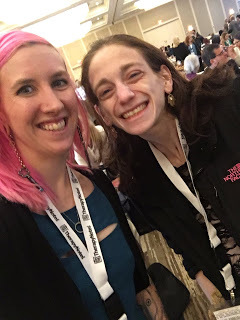 Kim & AmyI soon found Kim Zapata, a fellow panelist , and we struck up a great conversation. I am mostly apartment bound and my social life is one of a stay-at-home school dad. Nobody I know blogs about mental health, or, frankly, cares about the subject, so it was a delightful pleasure to trade blogging stories with a fellow mental health writer. Kim already knew me, which surprised me. When she first began her blogging journey, mine was one of the first blogs on depression that she found. She even found what I wrote helpful. That was very humbling for me. I don’t often get the opportunity to meet face to face with people who read my work. Kim was doing what I wanted to be doing more of, which was freelancing successfully, so I eagerly took mental notes. In fact, I’ve just started reading How to Be a Well-Paid Freelance Blogger by Carol Tice on my flight from Utah, so it was perfect timing to have that conversation.
Kim & AmyI soon found Kim Zapata, a fellow panelist , and we struck up a great conversation. I am mostly apartment bound and my social life is one of a stay-at-home school dad. Nobody I know blogs about mental health, or, frankly, cares about the subject, so it was a delightful pleasure to trade blogging stories with a fellow mental health writer. Kim already knew me, which surprised me. When she first began her blogging journey, mine was one of the first blogs on depression that she found. She even found what I wrote helpful. That was very humbling for me. I don’t often get the opportunity to meet face to face with people who read my work. Kim was doing what I wanted to be doing more of, which was freelancing successfully, so I eagerly took mental notes. In fact, I’ve just started reading How to Be a Well-Paid Freelance Blogger by Carol Tice on my flight from Utah, so it was perfect timing to have that conversation.We couldn’t find Natasha Tracy, the other panelist, so we found a table for the keynote and continued talking. We also struck up a nice conversation with a couple that was already at the table. I couldn’t believe how well I was doing socially. Now, it’s possible that they all have a completely different take on our conversations, but people don’t generally smile warmly while being tortured.
Then Amy popped by. The couple I was chatting with turned out to be Amy’s parents. If I thought Amy was amazing, her parents were more so. When you raise children with disabilities, handicaps, or difficulties, you grow tired of people who don’t share that experience telling you how to parent better. I found kindred spirits in Amy’s parents. We talked about the balance between caring for these children, raising them to adulthood, and letting them take chances with life—letting them live. I was so glad to have met them.
As I sat listening to the passionate keynote speech by Paul Gionfriddo about the history of the MHA and the need for better attitudes towards mental health in this century, I was struck by the presence of all those bright minds in the same room with me, all dedicated towards normalizing mental health, removing stigma, and promoting wellness. I don’t mean to gush. I was more than a little intimidated and in awe by the whole experience. I knew the MHA was big, but this conference showed me exactly how big they were.
 Soon, it drew closer to my panel’s time, and I became suddenly nervous. Would I tic? Would I completely forget what I was supposed to say? These were my main concerns, so I stepped outside and let the sun beat down on me, let the breeze blow across my face, leaned on my cane, and just breathed. Controlling anxiety begins with controlling your breathing. It didn't take long before I was ready.
Soon, it drew closer to my panel’s time, and I became suddenly nervous. Would I tic? Would I completely forget what I was supposed to say? These were my main concerns, so I stepped outside and let the sun beat down on me, let the breeze blow across my face, leaned on my cane, and just breathed. Controlling anxiety begins with controlling your breathing. It didn't take long before I was ready.I finally got a chance to chat with Natasha. We’ve known each other for years and have chatted often over Twitter, so meeting her in person was fun. She began blogging about mental health two years before I did. We didn’t have a lot of time to chat, but our shared journey helped her feel like an old friend to me. Then it was time for the panel.
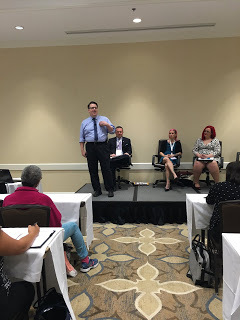 The theme was “Managing Mental Health: Let’s Blog About It”. Kim gave her presentation first. She was strong and inspirational. Then it was suddenly my turn. My shtick is humor, so I was glad that the audience laughed where I expected them to. I plan on writing my presentation up as a blog post, but I probably won’t be able to recreate it. Years ago, I discovered that I give terribly dull talks when I memorize them, so I memorize the outline instead. That way I can stay on point, but still interact dynamically with the audience. I even rolled my unfortunate unzipped fly moment earlier that day into the presentation. It made sense at the time, but for the life of me, I cannot remember how it tied in. If MHA never invites me back, we can point to that moment as the likely culprit.
The theme was “Managing Mental Health: Let’s Blog About It”. Kim gave her presentation first. She was strong and inspirational. Then it was suddenly my turn. My shtick is humor, so I was glad that the audience laughed where I expected them to. I plan on writing my presentation up as a blog post, but I probably won’t be able to recreate it. Years ago, I discovered that I give terribly dull talks when I memorize them, so I memorize the outline instead. That way I can stay on point, but still interact dynamically with the audience. I even rolled my unfortunate unzipped fly moment earlier that day into the presentation. It made sense at the time, but for the life of me, I cannot remember how it tied in. If MHA never invites me back, we can point to that moment as the likely culprit.I remembered everything except sharing my final slide with contact info. I also forgot to mention that my book was on sale…for the conference. If I felt bad about my amateur self-promotion efforts, when Natasha go up, I wanted to crawl underneath my seat. She was so powerful and organized. She didn’t miss a beat self-promoting herself. She also spoke passionately as an advocate for bipolar disorder.
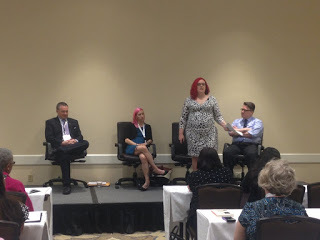 Then the audience had questions, fielded by our very capable moderator, Mike Thornsbury. He did a great job moving the conversations along. We also had a fantastic audience. It really was a memorable experience for me. When people came up to me after the panel and thanked me, or asked me for advice, I was quite humbled. Sometimes I just see myself as a clown, but I forget that others see me in an entirely different light.
Then the audience had questions, fielded by our very capable moderator, Mike Thornsbury. He did a great job moving the conversations along. We also had a fantastic audience. It really was a memorable experience for me. When people came up to me after the panel and thanked me, or asked me for advice, I was quite humbled. Sometimes I just see myself as a clown, but I forget that others see me in an entirely different light.Since this entry is already massively long, I’ll spare you the fiascos of my flight home and just summarize with two points. Besides, the real drama was getting strip searched by the TSA on my way to the conference. They claimed my leg brace triggered some type of chemical alarm. The flight back home was a lark in comparison.
The Price. I was so thankful that I had no ticking during my presentation. I didn’t even need my cane, which was ready by my chair. However, as the day wore on, I leaned on that cane more and more. My knee injury was the first thing to pay the price for my jet set jaunt, but the following day, I began a five day ticking episode. I couldn’t even walk. It was tough. But I’d do it all over again. I loved every minute of my trip, especially my short time at the conference. Ticking and insomnia are small prices to pay for such an opportunity.
The Critique. There are so many things I’d like to see done differently. Next time, I’ll practice with a power point presentation so I have muscle memory to aide me in getting that self-promotion slide in. I’ll also have business cards. Although I am glad I wore a shirt & tie to the conference, thus not sticking out like a bum in a sea of Dapper Dans in suits & ties, not having business cards was an amateur move. I’ll also opt for a redeye flight next time so that I can enjoy more of the conference. I’m going to be wiped out by the trip anyway. I might as well get the most out of it before I crash.
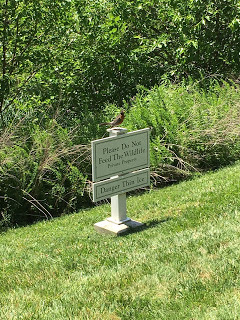 Another thing that I learned is that I am funny. The audience enjoyed my humor. My blog readers used to enjoy it, too, but since my divorce it has been very rare around here. I plan on changing that. In addition, I am one of a few people with ADHD who can write about it coherently, so I should build upon that skill.
Another thing that I learned is that I am funny. The audience enjoyed my humor. My blog readers used to enjoy it, too, but since my divorce it has been very rare around here. I plan on changing that. In addition, I am one of a few people with ADHD who can write about it coherently, so I should build upon that skill.I need to lose 30 lbs. I'm just too uncomfortable in my frame. If I want to do more conferences like this, I need to improve my health and my stamina.
Lastly, meeting the girls was a highlight in my blogging adventure. Kim left the conference to head over to Blog U, something I've thought of attending before, so maybe I should make plans for that conference, too, or one like it on this side of the continent. Over all, meeting Natasha & Kimberly has inspired me to do more—to step up my game. MHA was a great experience. I would love to be invited back again. I can’t thank all of you enough for supporting me in this journey.
⁂
If you thought this article was much too long, you’ll be relieved to learn that my book is a perfect length.
June 12, 2016
Suicide Watch: Can You Walk Away from Cyberbullying?

The other day a young girl from Florida named Tovonna committed suicide after friends posted nude photos & video of her onto Snapchat—a popular mobile app for sharing media with friends. According to reports, her mother didn’t understand what Tovonna was upset about. It’s possible she was hysterical and not clear, because it turns out she had been filmed while showering. Three hours after talking to her mother, she shot herself with her mother’s pistol.
Tovonna’s death has been overshadowed this weekend by the horrific gay bar mass-shooting in Orlando, but while some people might want to focus on gun control, and others might want to blame her family, I want to focus on cyberbullying.
According to Drapeau & McIntosh, suicide is the 2nd leading cause of individuals aged 15–24. Homicide places third. Every few years, cyberbullying plays a part in these tragedies, leading many to cry, “Something must be done!”, which usually amounts to curtailing free speech in one way or other, or taking away gun rights. Then nothing gets done about it.
In the cultural libertarian crowd I follow on Twitter, it is popular to mock anti-cyberbully advocate demands because they usually demand policing the net, abolishing anonymity, etc. They want to fix one problem by curtailing civil liberties. The typical response is “LOL Cyberbullying can’t hurt you. Just turn your phone off.”.
Can you just walk away from cyberbullying?Yes, you can walk away and put it out of your mind, but some people are better prepared to handle cyberbullying than others. Let’s explore why that is.
As an adult who regularly blogs about suicide, I have received threats, I have been told that nobody cares about me , and I’ve been told to kill myself. Angry trolls post their hateful comments, and I roll my eyes at them. I can do that because I don’t give their words power over me. I usually reply with something snarky and move on.
I have a grown up perspective. I see that some idiot on the internet wants me to kill myself because they disagree with me, and I laugh. Who are they to me? I have daughters, friends, and family that love me. I have readers who appreciate my writing. The trolls are often impotent gnats raging against a world they have no significance in. I just swat them away. If things get too heated on Twitter or Facebook, I know I can just throw my hands up in the air and say, “Enough! Time for a break!”, then walk away from the heat. I can choose to combat it again later, or just ignore it, as is usually the case. I don’t have to let their poison take up residence in my mind.
I can LOL and turn my phone off.Unfortunately, teenagers in general lack the maturity to do all of the above. Adults know how to let hurtful comments pass over them like a hot blast of air during a heat wave. We know the toxic comments aren’t credible, but for teenagers, social networks are everything. In fact, as any parent of teenagers can attest, their friends are more real and commanding of their attention than school, family life, or anything else that might be happening around them. When a teenager’s privacy is violated and photos of them are leaked online, that overwhelming feeling of impotency coupled with humiliation is crushing to their developing self-esteem. Cyberbullying is very real to them. It’s a hot blast of air all around them as they stand in a furnace of unwanted attention.
For Tovonna, who was all of fifteen years old, finding out that friends had filmed her showering, put it up online, then mocked her was too much for her to bear. Betrayal, shame, humiliation, and a crushing sense of powerlessness is likely what she was feeling when she decided to end her pain.
What can be done about cyberbullying?I suggest that we start at home. Don’t wait for intrusive feel good laws to get passed. Take charge of the situation now. Here are six tips that I have found to be very helpful when I learned cyberbullying was happening to my children:
Keep calm. You can’t help your child if you freak out. They need to be able to rely on your strength. Cyberbullying may not cause physical harm, but it does cause emotional harm. Help your kid deal with their feelings. Teach them how to be strong. They’re going to be overwhelmed without your help. Your child needs your help believing that they can get through whatever difficult situation they find themselves in. When they are besieged online, their world feels like it has ended. You may need to lend a little bit of your faith that the sun will rise. Teach your children that hurtful comments can be ignored. Start early! You won’t do your child any favors by waiting for a crisis to tell them not to let the words sting. You may not care about your child’s schoolmates’ opinions, but your child certainly does. Keep your relationship healthy so that your child can feel comfortable confiding in you. This is not an easy task. You aren’t the only parent frustrated that your child confides in peers over you. Keep cultivating that relationship! Teach your child how to reach out for help if images of them have been leaked online. This is something that should involve the police and school officials immediately. There is time for safety lectures later. Act quickly! If the images are nude and have crossed state lines, it becomes a matter of child pornography. The FBI could become involved, too.When we prepare ourselves mentally, we can LOL and walk away from cyberbullying. We decide whether the words and actions of others have power over us or not. This is a good skill to teach your children so that they don’t despair if they ever find themselves on the receiving end of cyberbullying. Sic the authorities on the culprits, follow my tips, and put all your efforts into comforting those developing minds.
⁂
I don't discuss cyberbullying much in my book, but you'll find many chapters on helping suicidal loved ones in it.
June 3, 2016
My TV Cure for Depression
I imagine you're wondering how television can cure anybody of anything. The news is depressing. Insipid sitcoms are depressing. The endless sea of reality TV is depressing. Doesn't it just give people headaches? How can I use television to treat my depression‽
For those reasons and more, TV is not my coping strategy of choice. I try to limit my TV time, and expressly avoid vegging out in front of it. TV is an ADHD sink hole. However, I can't deny that it helped me out one day. Let's explore why it worked.
The First Step Is to Be AwareLast week, I felt particularly down in the middle of a project. I recognized that I was moving into a deeper depression, but what was I going to do about it? I couldn't go out for a walk because I was ticking.[1] I couldn't exercise for the same reason. Besides, I was in the middle of a big project and couldn't afford to waste any time. Exactly at the moment I was resigning myself to grinning and bearing it, I realized that I was useless to the project as I was at the moment, I'd been working on it for an entire day without a break, and that I needed to stop pushing and just let my mind spin for a bit. I needed a TV break.
I sat down and watched one show, then analyzed how I was feeling. I decided I needed more time. This wasn't a situation where I was hooked on a show and needed to watch more. I could tell not enough time had passed yet. My depression was slowly abating, but hadn't lifted entirely. I watched one more show, felt much better, and then quickly got back to work with renewed vigor. I chuckled to myself that I had just used TV as therapy, because I usually avoid TV when I'm depressed.
The secret to why this worked for me that day lies within a combination of strategies that my TV break employed. Because I manage my depression and am skilled at self-analysis, I intuitively knew what I needed. That day, the solution was TV. Another day it could have been a long walk, a good book, or a phone call to a friend. I've got a long mental list of activities that I pull from.
This particular solution puts points 5, 6 & 7 of my Fighting Off Depression coping strategies together. Let's discuss them briefly so that you can think out of the box and come up with tailored solutions for yourself.
No. 5: Ignore ItCan you really ignore depression? You can if the depression is mild. I think of it as the difference between a headache and a migraine. The former is painful, but you can power through it. The later is debilitating and can't be put out of your mind. When you get better at analyzing yourself, you'll start to recognize which level of depression you are experiencing. I knew that my depression was mild, so ignoring it could work.
What does ignoring depression do? Depression is a chemical imbalance of the mind. Sometimes you just need time to let your mind regulate itself, but I have known people to despair when depression begins to settle in. Ignoring depression is something that they have to work at. We're all different.
However, if your depression is too deep, ignoring it is tantamount to putting off coping, so be prepared to shift gears to use another coping strategy if ignoring isn't effective.
No. 6: Do Something FunIf your brain can't regulate itself on its own, then it'll need some help. I have found that doing something fun boosts endorphins and can swing the pendulum away from depression. Deciding to watch a favorite program fits into this strategy. Television can excite our emotions. I was careful to pick a show that was filled with adventure and thrills, not tragedy. Since depression colors our thoughts so bleakly, it's important to come up with a list of upbeat activities ahead of time. Make your list diverse. For example, maybe TV worked for me this time, but next time I might want to bake sweets, or hang out with a friend.
No. 7: Engage your MindI chose to watch some anime with subtitles. In this case, doing something fun and engaging my mind were combined in the same activity. Usually, they are separate coping strategies. All that reading fired up my neurons and prevented me from drifting off into a TV stupor. The world is filled with things that can engage your mind, so make a list of your favorites to pull from when you are down.
Perhaps because of my ADHD, I often utilize distraction as a coping strategy for my depression, especially when the depression is mild. Sometimes, I have to go through a lot of activities before I can beat depression back. The deeper the depression, the more effort I have to put in to lift my spirits. This is the way I manage depression without medication.
While I entertained myself with some anime, I engaged my mind, and gave my brain some time to relax and regulate. I guess TV isn't so bad, after all.
⁂
If you liked this article, you'll probably like my book. It's better than reruns.
Wary of Psych Meds? Here is My Personal Experience With Them. ↩
May 8, 2016
Your Mental Health Is up to You
 "Tom Kelly - Light Painting"
"Tom Kelly - Light Painting"Somebody close to me recently mocked me online. They mocked my book. They mocked my invite to speak at the upcoming Mental Health America conference. They mocked all my recent achievements. They saw all of these achievements as me being bound to a lifestyle that will set me up for mockery. Ironic, I know. This person meant well, but did more harm than good at the time. How fortunate for me that I don’t need other people’s permission to feel good about myself.
People who don’t acknowledge your mental health issues aren’t going to acknowledge your achievements. They aren’t going to acknowledge your progress because they don’t understand it. They are so emotionally invested in the belief that we are weak when we recognize our weaknesses that they refuse to pat you on the back for even the smallest of achievements. They see your achievement as failure.
I know a guy from church a few years back who is so happy see me every time we run into each other. Yet when he asks me what I’ve been up to, he changes the subject the very second I mention my blog. He subscribes to the belief that my labels confine me. I know this because he’s earnestly lectured me about it, but he doesn’t spend a single moment with me to find out what I do to improve my life, nor does he bother to learn what my obstacles are. He cares about me, but my open acceptance of my ADHD & depression doesn’t fit into his world view. We talk about other things.
Does their dismissal of your struggles hurt? Of course, but I’m going to be honest with you. As hard as that type of disapproval can be to live through, their disapproval is meaningless. You are the ultimate authority on your progress. You know where you’ve come from and how close you are to success. This is because you are the one in control of your mental health. The power resides within you, not them.
There are going to be times when your depression will be in control of you instead of the other way around. Maybe you’re overwhelmed by family drama. Maybe overtime and stresses at work get you off your game. Maybe an unexpected illness or accident has occurred. You’re going to find yourself depressed because you forgot to maintain your well being. Your reserves will be depleted. It happens to all of us.
At that time, if you confide in people about your sudden bout of depression, maybe you already have a network established of supportive and understanding people to cheer you on, but more often than not you will hear tons of useless advice. If you find prayer helpful, you’ll get a tirade about the uselessness of prayer. If you find mindfulness helpful, you’ll be told it’s pseudo-religious bunk. Do you rely on meds? Somebody out there will lecture you about Big Pharma. You can’t win. Everybody will have an opinion of how you’re living your life wrong. How many of these people live with you day by day and witness your struggles? How many of these people share your burden? Sometimes even the experts will have useless advice. Everybody has their pet causes and philosophies. You are the only person who is responsible for you.
Last week was a very hard week for me. I had family issues draining my reserves. I was struggling financially. I was ticking quite a bit, too. Yes, I was managing my depression, but the depression felt like an 800 lbs gorilla being held behind a buckling closet door. I threw all my weight and effort at it, but I felt as if it would burst through at any moment. Then somebody close to me attacked me publicly. That closet door was close to giving way.
So how did I handle it? I let the toxic advice flow over me. I made the decision to not let any of the comments stick to me. I took a deep, cleansing breath, and let the irritation and pain go. I also cared for this person, so I replied in a professional and courteous manner. Then I immediately began working on my coping strategies. My chosen one for that moment was distraction. I binge watched a few episodes of “Ghost Whisperer”, and in between episodes, I renewed my determination to not let the attack affect me. It didn’t take long before the incident was behind me. Whatever your gimmick, keep at it. Don’t give other people power over your self-worth.
When you encounter cynical, doubting saboteurs, or pompous proselytizers, remember that only you know what works for you. You also know what doesn’t work. Rely on your own observations, then roll up your sleeves and get back on top of that depression.
Managing depression is always a struggle, but some days are definitely better than others. I know I am not weak because I acknowledge my depression. I am only weak if I give in to the depression. I ignore the naysayers and keep fighting. You can do it, too.
⁂
If you thought this was wordy, you should read my book.





